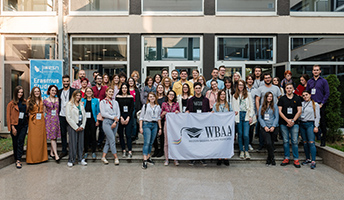Internationalisation and Mobility Conference

On October 25th and 26th 2019, the conference gathered for the first time ever in Serbia students, alumni of mobility programmes, representatives of higher education institutions and the civil sector, to discuss motivation and barriers to mobility in Serbia. Through panel discussion and workshops, they worked together to find ways to improve mobility in the country.
The first of its kind in Serbia, the Internationalisation and Mobility Conference, was a joint project of the Western Balkans Alumni Association and the Erasmus Student Network Serbia, which brought together students, alumni, representatives of International Relations Offices, EU Delegation to Serbia, the National Agency, as well as the National Youth Council.
During the first day of the conference, the 75 participants were introduced to the results of various studies in the field of Erasmus Plus programmes and international student mobility. Two studies focused on outgoing students, both those who have already participated in mobility and those who have not. It showed the barriers that students face most often when going on exchange, which are usually financial or administrative, but also what is it that motivates them the most to apply.
After the presentations of the studies, the panel discussion on the topic of mobility in Serbia took place. The speakers were Maksim Karanović from WBAA and ESN, Head of the International Relations Office of the Faculty of Science in Novi Sad, Gordana Vlahović, representative of the EU Delegation to Serbia Irena Radinović, representative of the board of directors of the Serbian Youth Council Jelena Mitrović, and Sofija Petrović from the National Agency (Tempus Foundation). The panel concluded that greater structural cooperation was needed between HEIs, student and alumni organizations, the Tempus Foundation and the EU Delegation to improve the quality of internationalisation of higher education in Serbia.
Finally, the day finished with 3 parallel workshops on topics of promotion of mobility programmes, reintegration of outgoing students, and internationalisation of education in Serbia.
Second day served as a training for alumni of the mobility programmes, WBAA and ESN members, as well as SKONUS (Student Conference of the Universities of Serbia) representatives. Together, they reflected on the presentations and discussions of day one, and then worked together to map out the main barriers to mobility, but also pinpointed all the relevant stakeholders, organisations, and institutions who can contribute to improving the quality of higher education in the country.
The participants were then split into two groups, one which focused on creating recommendations for stakeholders, such as higher education institutions and the civil sector, on how better to support the implementation and promotion of various mobility programmes.
The other group worked on an outline for the mobility guide, a document which will contain all the basic information about student and youth mobility, from where to find programmes and projects you can apply for, how the application works, to what to expect during and after your mobility period. They also tried to list all the important questions that students might have, which will be answered in the guide.
The outcomes of the last day’s training sessions, as well as informational videos filmed during the first day, will serve as a basis for developing a set of tools and recommendations that will be available to universities, higher education institutions and all stakeholders to make the mobility programmes more effective, better promoted and implemented.
Date: 11 Dec 2019
Author: Maksim Karanović